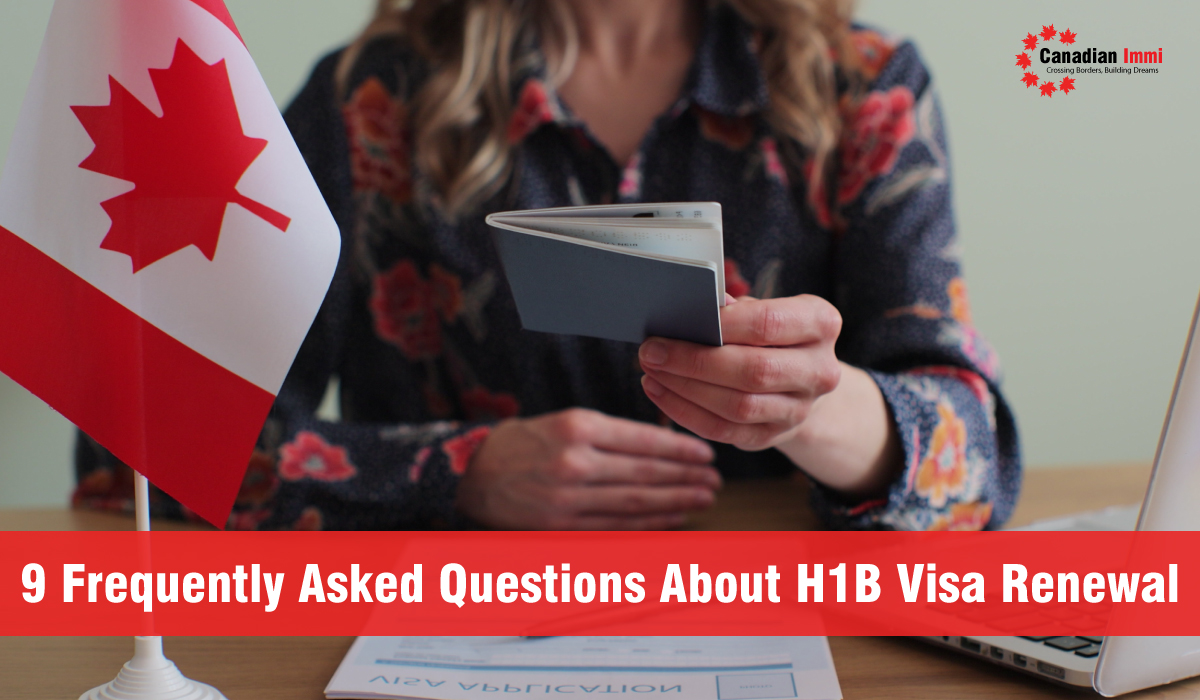Renewing an H-1B visa is a critical step for foreign professionals aiming to continue their employment in the United States. This comprehensive guide addresses nine of the most frequently asked questions about the H-1B visa renewal process, providing clarity on eligibility, procedures, timelines, and recent updates.
1. What Is the H-1B Visa Renewal Process?
The H-1B visa is initially granted for up to three years and can be extended for a maximum of six years. Renewing your H-1B visa involves your employer filing a new Form I-129, Petition for a Nonimmigrant Worker, with U.S. Citizenship and Immigration Services (USCIS). This petition must be accompanied by a certified Labor Condition Application (LCA) from the Department of Labor, affirming that your employment conditions meet the required standards. It’s advisable to initiate the renewal process up to six months before your current visa expires to ensure continuous lawful status and employment eligibility.
2. Am I Eligible for H-1B Visa Renewal?
To qualify for an H1B Visa Renewal, you must:
-
Currently hold valid H1B Visa Renewal status.
-
Continue to work in a specialty occupation requiring specialized knowledge and at least a bachelor’s degree.
-
Have an employer willing to sponsor your renewal by filing the necessary petition.
-
Ensure that the renewal petition is filed before your current H-1B status expires.
It’s important to note that if you have reached the six-year maximum stay, extensions may still be possible under certain circumstances, such as pending green card processes.
3. What Documents Are Required for H-1B Renewal?
The following documents are typically required for an H1B visa renewal:
-
Completed Form I-129, signed by your employer.
-
Certified LCA from the Department of Labor.
-
Letter from your employer confirming continued employment in the same or similar position.
-
Copies of your educational credentials, including degrees and transcripts.
-
Valid passport with at least six months’ validity beyond the intended stay.
-
Copies of prior Form I-797 approval notices.
Additional documents may be required depending on individual circumstances.
4. How Long Does the Renewal Process Take?
Standard processing times for H-1B renewals can range from 3 to 5 months, depending on USCIS workload and service center. However, premium processing is available for an additional fee, guaranteeing a response within 15 calendar days. It’s advisable to initiate the renewal process up to six months before your current visa expires to avoid any employment interruptions.
5. Can I Extend My H-1B Visa Beyond Six Years?
Under certain circumstances, you may be eligible to extend your H-1B status beyond the six-year maximum:
-
Pending Green Card Process: If you have an approved Form I-140 (Immigrant Petition for Alien Worker) and are awaiting a visa number, you may qualify for a three-year extension.
-
PERM or I-140 Pending for 365 Days: If a PERM labor certification or Form I-140 has been pending for at least 365 days, you may be eligible for one-year extensions.
These provisions allow H-1B holders to remain in the U.S. while their permanent residency applications are processed.
6. Can I Travel Outside the U.S. While My Renewal Is Pending?
Traveling outside the U.S. while your H1B Visa Renewal is pending can be risky:
-
Pending Petition: Leaving the U.S. may result in the abandonment of your renewal petition.
-
Visa Stamping: If you travel, you may need to obtain a new H-1B visa stamp at a U.S. consulate before re-entering.
-
Advance Planning: Consult with your employer and immigration attorney before making travel plans during the renewal process.
It’s crucial to ensure that your travel plans do not jeopardize your visa status.
7. What Is the 240-Day Rule?
The 240-Day Rule allows H-1B visa holders to continue working for their current employer for up to 240 days beyond the expiration of their authorized stay, provided that a timely and non-frivolous extension petition has been filed. This provision ensures that employees can maintain their employment while awaiting USCIS’s decision on their renewal petition.
In 2025, several updates have been made to the H1B Visa Renewal process:
-
Domestic Visa Renewal Pilot Program: The U.S. launched a pilot program allowing certain H-1B visa holders to renew their visas within the U.S., eliminating the need to travel abroad for visa stamping.
-
Interview Waiver Expansion: The Department of State expanded eligibility for interview waivers, allowing more applicants to renew visas without an in-person consular interview, provided they meet specific criteria.
These changes aim to streamline the renewal process and reduce the burden on applicants.
9. How Does H-1B Renewal Affect My Dependents?
H-4 visa holders (spouses and children of H-1B visa holders) can also extend their status concurrently:
-
H-4 Extension: File Form I-539 to extend H-4 status.
-
Employment Authorization: Spouses may apply for an Employment Authorization Document (EAD) if the H-1B holder has an approved Form I-140.
It’s important to coordinate the renewal of H-1B and H-4 statuses to ensure that dependents maintain lawful status in the U.S.
Conclusion
Renewing your H-1B visa is a critical step in continuing your professional journey in the United States. By understanding the eligibility requirements, preparing necessary documentation, and staying informed about policy changes, you can navigate the renewal process with confidence. Always consult with your employer and immigration professionals to ensure compliance with all regulations and to address any unique circumstances in your case.

